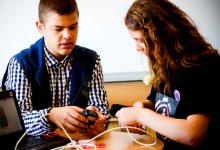Collaborative Learning
Working together to solve problems and complete projects deepens students’ learning and builds collaborative skills. Learn how to design activities to help develop these skills.
12 Buddy Systems That Support Learning and Student Well-Being
Encouraging students to ‘look out for each other on purpose’ has a powerful impact. These classroom and schoolwide strategies can help you get started.Exploring Narrative Elements Through a Drama Game
Using an improv exercise to practice the parts of a story gets ideas flowing for students—and helps them add structure to their writing.6 Ways to Maximize Turn and Talk
When a few simple structures are put into place, teachers can bring this staple activity for classroom collaboration to the next level.63.7kYour content has been saved!
Go to My Saved Content.How Classroom Jobs for Teens Instill Responsibility
When middle and high school students take ownership of tasks in their classroom regularly, they build a culture of teamwork and support.Activating Learning by Milling to Music
When students pretend they’re at a fancy party making small talk, a simple brainstorm for writing ideas becomes more lively, more cooperative—and more effective.347.8kYour content has been saved!
Go to My Saved Content.Improv in the Classroom
A collection of our popular articles and videos about how theater games and improvisation can spark creativity, build relationships, and boost academics and executive function skills alike.115.8kYour content has been saved!
Go to My Saved Content.16 Variations on Think-Pair-Share to Keep Students Engaged
Teachers and students use this classic learning strategy often. To keep it from getting stale, try these tweaks.22 Powerful Closure Activities
Quick activities that can be used to check for understanding or emphasize key information at the end of a lesson.1.1MYour content has been saved!
Go to My Saved Content.Helping Teens Build Skills Through Station Rotation
When large concepts are broken into small chunks—and learned through hands-on activities—students find confidence to tackle new challenges.6.4kYour content has been saved!
Go to My Saved Content.60-Second Strategy: Whiteboard Relay
The team competition is fierce in this informal assessment activity, in which students have to work together to win.190.4kYour content has been saved!
Go to My Saved Content.8 Closing Activities to Wrap Up a Lesson
Lock in the day’s learning with these closing activities that check for understanding and clear up misconceptions.Building Social Skills With Games in Kindergarten
Through classic games, students can learn how to take turns, collaborate, and solve problems—skills that will serve them well beyond the classroom.12.8kYour content has been saved!
Go to My Saved Content.Student-Centered Learning: It Starts With the Teacher
Teachers encourage student-centered learning by allowing students to share in decisions, believing in their capacity to lead, and remembering how it feels to learn.480.2kYour content has been saved!
Go to My Saved Content.Building Problem-Solving Skills Through ‘Speed Dating’
When students solve each other’s problems, they gain confidence in their own skills and witness the power of collaboration in real time.101.5kYour content has been saved!
Go to My Saved Content.Golden Rules for Engaging Students in Learning Activities
Six factors to consider in designing lessons to help increase student engagement behaviorally, emotionally, and cognitively.442.4kYour content has been saved!
Go to My Saved Content.












